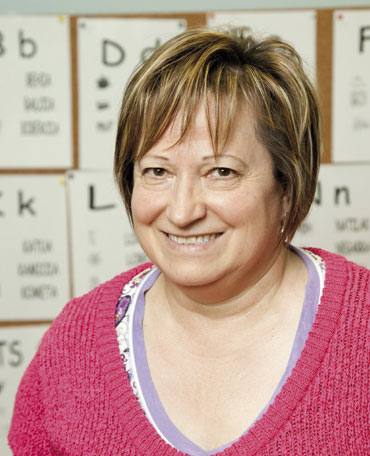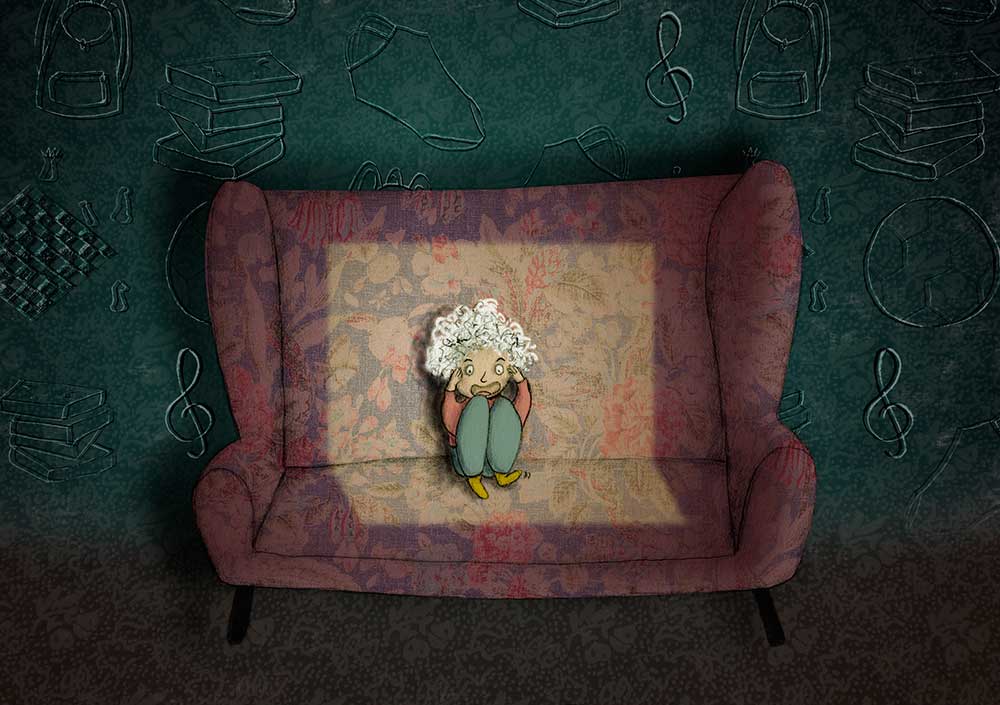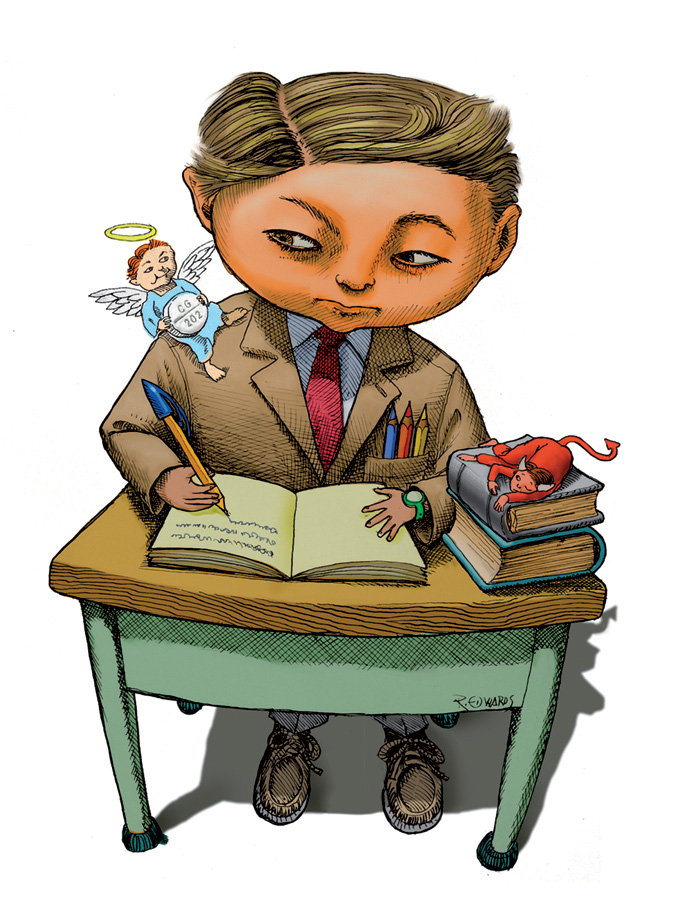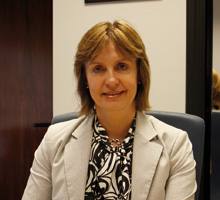"Children with attention deficit are not poorly educated children"
- Fourteen years ago, Maria Jesús Torres posted a press release to contact other parents with hyperactive children. Six mothers met in a cafe. Thus was born ADHI Association of Children and Families with Attention Deficit Hyperactivity Disorder, the first in the Spanish State. It currently has about 500 partners.

How did this partnership begin?
I posted an announcement in the press to contact the parents of hyperactive children, and we gathered six mothers. At that meeting we didn’t take any badges to get to know each other, or that clothes, or something under his arm… and it wasn’t necessary. As we entered, we already knew who we were on the date. When we started telling ourselves about the experiences we had at home, it was very beneficial, very therapeutic for everyone. Seeing that other people had similar things happening and made the same mistakes as you did, it was very beneficial for everyone. After that first meeting, when I came home, I saw my daughter for the first time as a special child, rather than as a problem. I will never regret it. At first we met every fifteen days to discuss self-help issues, and soon afterwards we decided to create the partnership. We started making papers in October, and by January everything was done. By then, in addition to self-help groups, groups had also been set up to work on the children's social skills. My goal was to create a foundation to avoid the mistakes that my parents make as a result of ignorance.
Her daughter's situation was your engine. Did the problems start since I was very young?
The first few years were very hard, and in fact, I've wiped them almost completely out of my head. I have two other children, the over 37 and the second one is 31. I'm convinced that the second is also an AGHN, but it's not diagnosed. It's very clear, it's very good at work and it's done very well everywhere. But the little one has never been accepted or understood. People have always found it guilty. He has always been guilty of all the problems his own disorder caused him. At 4 years old, I was told I was the last of the class. My answer was that I had to be someone. The pediatrician sent us to the neurologist and was diagnosed there. They told me that it was “hyperkinetic”, since that word was used at that time. Over time, the problems were increasing. Without understanding what is happening when you are with a child like this, you do nothing but rebuke and punish him. I didn't know what to do or how to behave. Every now and then she would phone a cousin and cry.
My daughter at the age of 8 fell into a terrible depression and until the age of 11 was very quiet and despondent. In addition, I had a psychological blockade so a psychologist told me and for two years I could not touch my daughter. A great barrier was erected between us. She was depressed and I couldn't touch her or embrace her. She noticed my contempt. For example, when we were sitting on the couch, if our hands were touched involuntarily, we would remove them immediately, as if the devil touched us. Now I feel like I couldn't give her the love I needed. I had to do therapy for two years in Pamplona to overcome it. I felt guilty and felt still today. The origin of this blockade was the one that the psychologist told us, but I don't remember what it was, because I completely erased it from my head. Eventually that barrier disappeared, but then it was late and she didn't want me to get closer. Coexistence has smoothed that situation and at the age of 14, in the deep and harsh crisis he suffered, I could at least help him a little.
What are these children and young people like?
You find it very difficult to concentrate on what you want. Its head is like a parabolic antenna: it collects a lot of information, but it doesn't hold anything. All stimuli are attended because they are not able to distinguish. It helps to introduce the message simultaneously from more than one sense: sight, hearing and even touch or smell when possible. We need to understand and offer mental structures or executive functions that they don't have. They suffer terribly because nobody understands them. They play without thinking and that brings deplorable consequences: penalties, reproaches, bad notes… But at the same time they do not know what is going on, where it is empty and ask each time: “What have I done now?” They do everything without thinking about the consequences, and they also don't learn. They repeat wrong behaviors over and over again. They suffer from brutal pressure, which often leads to situations of sadness and depression. Some say that with 8 short years they want to die. When they reach adolescence, they ask more questions, what happens to them, why they are different… That is why they need to know that there is a place where they understand, that they value themselves and that they open the way to do many things. At first there are pitfalls, weary and sad. Over time that changes and you can see that they come more joyful. That's very nice. Every evening, more than 70 children and young people attend the sessions organized by the association.
What is the life of the day at home like?
If the child has not taken on daily tasks (dressing, breakfast, tooth washing…), the day can be hard from the start. You must get out of bed an hour or a half in advance to get to school. From the first minute you will start to perform your tasks: you will dress him, you will put breakfast in his mouth... They start, for example, to put a sock and say goodbye to anything. In this way, when the second is put in place, it has already been half an hour. They go to the bathroom and forget they've gone to wash their teeth. And at night, as they come and down the street, bad moments happen. Mothers, above all, have a bad time. That is why this aid is needed. Fathers and mothers must learn techniques to change the behavior of boys and girls. They need us when they're young and we have to know how to give ourselves affection and discipline at the same time. For me, the hardest part is to see everything I did wrong in the early years. My only answer was to rebuke her for everything she did to be AGHN.
It will be difficult to admit it to parents…
Some do not accept it at first and there is nothing worse than denial. Parents must be given time to reflect and recognize the situation. The truth is that these children are physically very normal, so it's sometimes hard to believe that they have a mental disorder, but there's enough scientific evidence to prove that it exists today. It's doctors who have to diagnose and treat. However, we still find professionals today who say that this disorder does not exist in the field of health and, above all, in the field of teaching. Social pressure is terrible, so the partnership helps many parents: here they can tell you things that happen to them in their daily lives without being questioned and that helps a lot, because they often have to keep quiet. Before we created the partnership, nobody would tell us what we had to do. What we were doing was worthless, we just knew it. We had a big problem, and when we got home, you were there, between the four walls, and the thing was with you.
How is this issue addressed?
Social skills are working to overcome these obstacles. Those who do not have help learn and overcome obstacles as they can, suffering a lot. This disorder is not new. This genetically transmitted disease was first described in 1902. What happens is that in the past, academic and social demands were different, and when you went out without graduating at the age of 14, you had no problems finding work in school. Now for them everything is much more difficult. However, we must not forget that this problem has nothing to do with intellectual capacity. And that is that there are also boys and girls with great capacity. In any case, we have to believe in them and let us not forget that with our help they will go ahead. Finding love at home is essential, as from the outside they have enough negative message. They want to please their parents above all else. They want to be admitted. It's very important to feel loved, whatever it is, but parents don't know how to act. My goal is that one day they say, “I am hyperactive and what?” If you help them, if you give them structures that they don't have, you can get very good results.
Can you see where heredity comes from?
In some cases, yes. In the family you see one or the other. In my house it is quite clear that hyperactivity has been inherited from my husband, that they cannot sit still, and impulsivity, on the contrary, has been received from me. Hyperactive people are not standing, but this can also be positive if they get along well. They're very active in themselves and they have other skills. There are some that are very good for public relations, for example. Many seek professions that need to move and travel and feel great. In order to achieve this, impressive work must be done. Another problem is the lack of attention, although in many cases they have gone together. It is up to us, fathers and mothers, to seek resources and to provide solutions to governments and institutions. I say to all politicians that we are a very good investment: if we now give them help, they will avoid problems for the future and they will have normal citizens and workers.
Maria Jesus Torres Mendicoa elbetearrak 59 urte ditu eta ADHI elkarteko sortzaile eta lehendakaria da. Idazkari ikasketak egin zituen Donostiako Josefinen moja ikastetxean, baina amaitu baino lehen familiak zuen dendan lan egiteko itzuli behar izan zuen herrira. Duela hogeita hamazazpi urtetik Elizondon bizi da, ezkondua dago eta bi seme eta alaba baten ama da. Neskak arreta gabeziaren trastornoa du. Goizetan eta asteburuetan garbiketa lanak egiten ditu ogibidez. Arratsaldetan elkartearen egoitzan eta hamaika herri eta ikastetxetan ibiltzen da haur hiperaktiboen guraso eta irakasleekin lanean, informazioa emanez, boluntario. Ama adoretsua, ezbairik gabe.
“Begiratu hutsean ezin da esan haur batek trastorno hori duenik. Diagnostikoa egin behar da. Gurasook nabari dugu lehenbizi eta gero ikastetxean, eskakizun akademikoak zenbat eta handiagoak izan, trastornoaren sintomak orduan eta gehiago ateratzen dira. Gauzak antolatu, ordenatu, aurreikusi, denboran kokatu... Ahalmen horiek ez dituzte berezkoak, baina landuz gero, ikas ditzakete”.
Familia batean nahasmenduak jotako haur bat baino gehiago egon daiteke. Nafarroako elkartean batzuk dira nahasmendudun bi eta hiru ume dituztenak eta bat bada jotako lau ume dituena. Nafarroan 3.000 bat izan daitezke AGHN edo Arreta Gabezi, Hiperaktibitate eta Inpultsibitate Nahasmendua dutenak, baina 500 baino ez daude diagnostikatuak. Guztien %5 eta %7 artean. Erdiek, gutxi gorabehera, elkartearen laguntza jasotzen dute. Estatistiken arabera ikasgela bakoitzeko AGHN duen haur bana dago.
“Baldintzarik gabeko maitasuna eman behar zaie. Haur hauekin bizitzea zaila da, baina egia da, bestalde, batzuetan etxean sortzen dituzten arazoak baino garrantzitsuagoak direla guretzat kanpotik, gizartetik, datozkigun mezu negatiboak. Presio soziala ikaragarria da. Mundu guztiak erakusten dizu nola hezi behar dituzun zure seme-alabak. Zenbat aldiz aditu behar izan dugu gaizki hezitako haurrak direla, guk asmatutako kontua dela, berehala pastilla ematen diegula jasaten ez ditugulako, oso guraso permisiboak izan garela eta orain ezin ditugula maneiatu edo bi zaplaztekorekin hori konpontzen dela… Halakorik esaten duenak ez daki zer den trastorno hau eta ez daki zer nolako oinazea eragiten dien gurasoei eta, bereziki, haurrei”.
Elkartean euskarari oso trataera eredugarria ematen diote. Lanean diharduten sei profesionaletatik erdia euskaldunak dira. Eskaintzen diren programa nagusiak eta terapia instrumentala ere euskaraz egin daitezke. Horrez gain lan egiteko erabiltzen dituzten materialak euskaratu dituzte urte hauetan”.
Ikasleak ez direla gai eserita adi egoteko, ez dutela arreta jartzen, hiperaktibo asko dagoela… kexa orokor diren garaiotan, hain juxtu eserita denbora gehiegi igarotzen dutela uste du Angela Hanscom pediatrak: haurrak ez dira behar adina mugitzen, eta horren ondorioz... [+]
“Hemendik urte batzuetara, haurrak gehiegi medikatzeagatik sortutako gaixotasunez kezkatzen hasiko gara eta ea nola desegiten dugun egindako guztia”.
Hamar gaitz asmatu, farmazeutiken eskutik artikuluak iritzi kontrajarriak sorrarazi ditu. Hiperaktibitatea gaitz asmatuen zerrendan jartzeak piztu du polemika gehien.
Horixe hezkuntza arloko jendeak helarazitakoa: irakasleak arduratuta daudela, gero eta haur gehiagok duelako Arreta Gabeziaren Hiperaktibitate Nahasmendua delakoa, kopuru kezkagarrietara iristeraino. Eta hori entzunda, gogora etorri zait Diagnostiko okerren ondorio... [+]



















